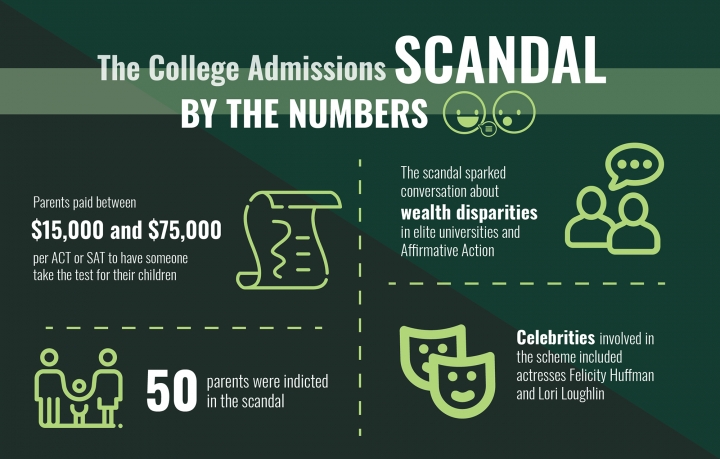In 2019, 50 people, including celebrities Felicity Huffman and Lori Loughlin, were charged in a bribery scheme dubbed “Operation Varsity Blues” in regard to fraudulently getting their kids into prestigious colleges.
Wealthy parents were accused of bribing college coaches, who falsely made students look like star athletes, and others who proctored tests to falsely adjust a student’s test scores, to help admit their children into some of the most elite colleges in the country, including Yale, Stanford and Georgetown.
Applying for colleges can be a daunting process, and unfortunately, some families took extreme measures and were caught manipulating the system, said Kristen Hatfield, director of admissions for the University of St. Thomas in St. Paul, Minn.
“I think it speaks to families’ anxiety over the admission process,” Hatfield said. “I think that’s something that was important for admissions professionals to learn from it.”
Overall, the scandal painted the entire college admissions process in a bad light when there were so few schools and families involved in the scandal, Hatfield said.
Stressful process
 The college application process can involve a lot of stress and unknowns for students and their families. It’s a process of a student putting themselves out there for someone to evaluate and decide whether they should be admitted to a school, Hatfield said.
The college application process can involve a lot of stress and unknowns for students and their families. It’s a process of a student putting themselves out there for someone to evaluate and decide whether they should be admitted to a school, Hatfield said.
But the admissions process is a two-way street.
“Yes, you have to find a school that’s going to be the right fit for you,” Hatfield said. “But you also have to find a school that you’re going to love and that’s going to be the right place for you to go.”
Hatfield recommends that students focus on what a school offers that might make it a place they will want to spend the next four years. Don’t get too stuck in things like the prestige of big-name schools.
Students want to find a college fit where they’ll be comfortable and an environment that will help them flourish, make them get up in the morning and have passion for what they want to study, Hatfield said.
Keri Zweig Risic, interim executive director of the office of admissions for the University of Minnesota, suggests applying to more than one school so a student has options and can choose a good fit based on their interests.
“So we really encourage students to look for schools that offer programs and majors and opportunities that help them support or find their own passions,” Zweig Risic said.
A fit to be found
Searching for that best fit in the college admissions process is the best course to take when choosing a college. Because ultimately, getting into college shouldn’t be seen as a prize to be won, like the scandal turned it into, “but a fit to be found,” Hatfield said.
Zweig Resic offered a housekeeping tip as well: Pay attention to the email account you use when applying because colleges follow up with additional information or requests within the application process. She also encourages students to bring their own voice to the application review.
 “This is their opportunity to share more information about themselves and bring their own voice to the answers on the application,” Zweig Resic said. “We’re trying to learn about you and your experiences that make you, you.”
“This is their opportunity to share more information about themselves and bring their own voice to the answers on the application,” Zweig Resic said. “We’re trying to learn about you and your experiences that make you, you.”
Getting into college also isn’t something that determines a student’s worth. That can be a tough concept to swallow when students aren’t admitted to certain schools and feel like they’re not good enough, Hatfield said.
“it’s really about looking for the place you feel comfortable, you love the campus and that the people are warm and friendly,” Hatfield said. “Those are the reasons that you should choose a school.”
There are a lot of factors that go into a college choice. Think about things like location, small vs. big schools, what majors a school offers or a city vs. rural school are some places to start in order to narrow down a search, according to Hatfield.
The financial piece is also part of the process down the road, too, since schools “certainly don’t want students to make decisions that they regret later in terms of what kind of scholarships they were given,” Hatfield said.
Hatfield doesn’t think a student can know if a college might be a good fit until they visit a school.
“Until you actually set foot on that campus, it’s really hard to know if that’s going to be the right place for you or not,” Hatfield said. “But a couple of visits in, and it’ll be a little more clear to the student in the process.”

 Source:
Source: